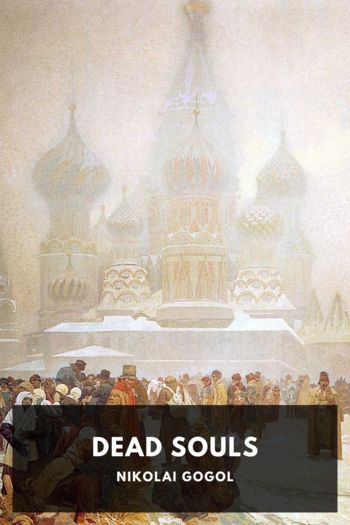Short Fiction - Nikolai Gogol (best selling autobiographies TXT) 📗

- Author: Nikolai Gogol
Book online «Short Fiction - Nikolai Gogol (best selling autobiographies TXT) 📗». Author Nikolai Gogol
“What news? have you been successful?” he asked with the impatience of a wild horse.
But before the Jews had recovered breath to answer, Taras perceived that Mardokhai no longer had the locks, which had formerly fallen in greasy curls from under his felt cap. It was evident that he wished to say something, but he uttered only nonsense which Taras could make nothing of. Yankel himself put his hand very often to his mouth as though suffering from a cold.
“Oh, dearest lord!” said Yankel: “it is quite impossible now! by heaven, impossible! Such vile people that they deserve to be spit upon! Mardokhai here says the same. Mardokhai has done what no man in the world ever did, but God did not will that it should be so. Three thousand soldiers are in garrison here, and tomorrow the prisoners are all to be executed.”
Taras looked the Jew straight in the face, but no longer with impatience or anger.
“But if my lord wishes to see his son, then it must be early tomorrow morning, before the sun has risen. The sentinels have consented, and one gaoler has promised. But may he have no happiness in the world, woe is me! What greedy people! There are none such among us: I gave fifty ducats to each sentinel and to the gaoler.”
“Good. Take me to him!” exclaimed Taras, with decision, and with all his firmness of mind restored. He agreed to Yankel’s proposition that he should disguise himself as a foreign count, just arrived from Germany, for which purpose the prudent Jew had already provided a costume. It was already night. The master of the house, the red-haired Jew with freckles, pulled out a mattress covered with some kind of rug, and spread it on a bench for Bulba. Yankel lay upon the floor on a similar mattress. The red-haired Jew drank a small cup of brandy, took off his caftan, and betook himself—looking, in his shoes and stockings, very like a lean chicken—with his wife, to something resembling a cupboard. Two little Jews lay down on the floor beside the cupboard, like a couple of dogs. But Taras did not sleep; he sat motionless, drumming on the table with his fingers. He kept his pipe in his mouth, and puffed out smoke, which made the Jew sneeze in his sleep and pull his coverlet over his nose. Scarcely was the sky touched with the first faint gleams of dawn than he pushed Yankel with his foot, saying: “Rise, Jew, and give me your count’s dress!”
In a moment he was dressed. He blackened his moustache and eyebrows, put on his head a small dark cap; even the Cossacks who knew him best would not have recognised him. Apparently he was not more than thirty-five. A healthy colour glowed on his cheeks, and his scars lent him an air of command. The gold-embroidered dress became him extremely well.
The streets were still asleep. Not a single one of the market folk as yet showed himself in the city, with his basket on his arm. Yankel and Bulba made their way to a building which presented the appearance of a crouching stork. It was large, low, wide, and black; and on one side a long slender tower like a stork’s neck projected above the roof. This building served for a variety of purposes; it was a barrack, a jail, and the criminal court. The visitors entered the gate and found themselves in a vast room, or covered courtyard. About a thousand men were sleeping here. Straight before them was a small door, in front of which sat two sentries playing at some game which consisted in one striking the palm of the other’s hand with two fingers. They paid little heed to the new arrivals, and only turned their heads when Yankel said, “It is we, sirs; do you hear? it is we.”
“Go in!” said one of them, opening the door with one hand, and holding out the other to his comrade to receive his blows.
They entered a low and dark corridor, which led them to a similar room with small windows overhead. “Who goes there?” shouted several voices, and Taras beheld a number of warriors in full armour. “We have been ordered to admit no one.”
“It is we!” cried Yankel; “we, by heavens, noble sirs!” But no one would listen to him. Fortunately, at that moment a fat man came up, who appeared to be a commanding officer, for he swore louder than all the others.
“My lord, it is we! you know us, and the lord count will thank you.”
“Admit them, a hundred fiends, and mother of fiends! Admit no one else. And no one is to draw his sword, nor quarrel.”
The conclusion of this order the visitors did not hear. “It is we, it is I, it is your friends!” Yankel said to everyone they met.
“Well, can it be managed now?” he inquired of one of the guards, when they at length reached the end of the corridor.
“It is possible, but I don’t know whether you will be able to gain admission to the prison itself. Yana is not here now; another man is keeping watch in his place,” replied the guard.
“Ai, ai!” cried the Jew softly: “this is bad, my dear lord!”
“Go on!” said Taras, firmly, and the Jew obeyed.
At the arched entrance of the vaults stood a hajduk, with a moustache trimmed in three layers: the upper layer was trained backwards, the second straight forward, and the third downwards, which made him greatly resemble a cat.
The Jew shrank into nothing and approached him almost sideways: “Your high excellency!





Comments (0)